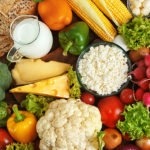What are the worse foods for arthritis?
In general, what are the worst foods for arthritis? Certain dietary choices can significantly aid individuals with arthritis in managing their symptoms. For example, avoiding specific foods may reduce inflammation and discomfort.
This includes steering clear of inflammatory fats, products containing added sugars, foods high in salt, nightshade vegetables, and items rich in purines, which can exacerbate symptoms.
On the other hand, incorporating certain foods into the diet can also be beneficial for symptom management. A diet that emphasizes whole fruits and vegetables, along with anti-inflammatory fats, can promote overall health and potentially alleviate some arthritis-related issues.
For tailored guidance, consulting with a registered dietitian can be invaluable. They can offer detailed insights into anti-inflammatory diets and assist in crafting a personalized eating plan that supports arthritis management while ensuring that essential nutrients are not overlooked.
To explore further, continue reading about specific foods that individuals with arthritis may consider limiting in their diets. This article also covers beneficial foods to include, the principles of anti-inflammatory diets, and much more.
Foods To Limit
Limiting certain types of food can be beneficial for managing arthritis symptoms. Here are some categories to consider reducing in your diet:
- Inflammatory Fats
Certain fats can exacerbate inflammation within the body. The Arthritis Foundation suggests that individuals with arthritis should limit their intake of the following types of fats:
-
- Omega-6 Fatty Acids: These are found in several oils, including corn, safflower, sunflower, and vegetable oils. While omega-6 fatty acids aren’t harmful in moderation, many people consume them in excess, which can contribute to inflammation.
- Saturated Fat: Commonly found in meat, butter, and cheese, saturated fat should make up less than 10% of total daily calorie intake for individuals aged 2 years and older.
- Trans Fats: Known for their detrimental effects, trans fats lower “good” cholesterol levels while raising “bad” cholesterol levels, further promoting inflammation. Although the Food and Drug Administration (FDA) banned partially hydrogenated oils—one of the main sources of artificial trans fats—in 2018, some processed foods may still contain them. It’s wise to check nutrition labels and ingredient lists to avoid these harmful fats.
- Added Sugar
Research from 2020 indicates that individuals who regularly consume sugar-sweetened sodas have an increased risk of developing rheumatoid arthritis (RA). Moreover, frequent intake of sugary beverages can contribute to obesity, inflammation, and various chronic conditions.
Numerous foods contain added sugars, so it’s essential to read labels to understand how much added sugar is present in a product. Common sources of added sugars that can significantly impact your diet include:
-
- Cakes
- Pastries
- Cookies
- Jams and other sweet spreads
- White bread
- Soft drinks
- Fruit juice
- Certain types of alcohol, such as beer and cider
- Condiments like ketchup, relish, and barbecue sauce
Being mindful of these foods can play a crucial role in managing arthritis symptoms and promoting overall health.
- High Salt Foods
Excessive sodium intake may elevate the risk of developing autoimmune diseases such as rheumatoid arthritis (RA) and can exacerbate existing RA symptoms.
It is recommended that individuals consume less than 2,300 milligrams (mg) of sodium per day, which is approximately equivalent to 1 teaspoon of salt.
Common high-sodium foods that one might consider avoiding include:
- Pizza
- Burgers
- Fast food items like tacos and burritos
- Deli meat sandwiches
- Chips and other savory snacks
To help reduce sodium intake, it’s beneficial to avoid packaged foods and focus on cooking with fresh ingredients.
- Nightshades
Nightshade vegetables contain a compound known as solanine, which some research suggests may interfere with gut microbiota and potentially increase inflammation.
The Arthritis Foundation recommends that individuals who suspect that nightshades may be aggravating their symptoms exclude these foods from their diet for a period of two weeks, then gradually reintroduce them one at a time to monitor for any reactions.
Nightshade vegetables include:
- Tomatoes
- Bell peppers
- Chili peppers
- Eggplant
- Potatoes
Maintaining a food diary can be a helpful tool for tracking any reactions to specific foods. If symptoms occur upon reintroducing any nightshades, it may be wise to eliminate these vegetables from the diet.
- Foods High in Purines
For individuals with gout, healthcare providers often recommend a low purine diet alongside medications. Purines are natural substances found in various foods that the body converts into uric acid. When uric acid accumulates in the bloodstream, it can lead to gout attacks.
According to the Centers for Disease Control and Prevention (CDC), the following foods and drinks are particularly high in purines:
- Organ meats, such as liver
- Red meat
- Certain seafood, including:
- Anchovies
- Mussels
- Sardines
- Scallops
- Trout
- Tuna
- Beer and other alcoholic beverages
However, a review from 2018 indicates that some purine-rich vegetables, like cauliflower, mushrooms, and beans, do not appear to be linked to an increased risk of gout.
- Advanced Glycation End Products (AGEs)
AGEs are inflammatory compounds that accumulate in tissues, particularly as individuals age. People with conditions such as rheumatoid arthritis (RA) often have elevated levels of AGEs, and reducing these levels may help alleviate inflammation.
Both fat and sugar can increase AGE levels in the body, while certain food processing methods and high-temperature cooking can raise AGE levels in foods. Foods known to be high in dietary AGEs include:
- Fried bacon
- Roasted poultry skin
- Pizza
- Certain cheeses, such as Parmesan and cream cheese
- Salty snacks like potato chips and crackers
- Butter and margarine
- Processed and Red Meats
Diets high in processed meats, red meat, and dairy products may exacerbate RA symptoms. Some studies have even suggested a correlation between red meat consumption and the early onset of RA. Examples of red meat include:
- Beef
- Goat
- Lamb
- Mutton
- Veal
- Venison
- Pork
- Refined Carbohydrates
Consuming a diet high in refined carbohydrates may contribute to increased inflammation in individuals with arthritis. High intake of refined carbohydrates can also lead to insulin resistance and is associated with a higher risk of obesity—both of which are risk factors for arthritis.
Refined carbohydrates include added sugars and grains that have undergone extensive processing, stripping away fiber and nutrients. Common examples of foods high in refined grains are:
- White bread
- Many baked goods
- Desserts
While more research is needed in this area, a small study from 2020 suggests that a low-carbohydrate diet may help reduce pain symptoms in individuals with knee osteoarthritis.
Can Diet Help Arthritis?
Diet can play a significant role in managing arthritis and its symptoms. By incorporating specific foods, individuals can:
- Reduce Inflammation Levels: Certain foods possess anti-inflammatory properties that can help lower inflammation in the body. Chronic inflammation can lead to ongoing discomfort and may contribute to the progression of arthritis.
- Maintain a Moderate Weight: A healthy diet can support weight management, which is crucial for individuals with arthritis. Excess weight places additional stress on joints, leading to increased pain and inflammation. Fat cells produce cytokines—immune molecules that promote inflammation—so maintaining a moderate weight can help mitigate these effects.
- Promote Tissue Health and Healing: Nutrient-rich foods can support overall tissue health and healing processes, which is essential for individuals with arthritis.
Typically, inflammation serves a protective function by defending against infections and facilitating wound healing. However, when inflammation becomes chronic, it can lead to persistent symptoms and health issues.
The foods you consume can significantly impact your body’s inflammation levels. Some foods can promote inflammation, while others are known for their anti-inflammatory effects.
According to the Arthritis Foundation, numerous studies indicate that anti-inflammatory foods can help alleviate arthritis pain and slow disease progression.
In addition to overall dietary choices, it’s important to recognize that some types of arthritis have specific trigger foods. For example, foods high in purines can lead to gout attacks. Adjusting the diet to avoid these trigger foods may help manage symptoms more effectively.
Foods to Eat for Arthritis Management
Incorporating certain foods into your diet can provide significant benefits for individuals with arthritis. Here are some key food groups to consider:
Anti-Inflammatory Fats
The Arthritis Foundation highlights several types of fats that can help reduce inflammation:
- Unsaturated Fats: These healthy fats are found in olive oil, avocado oil, and various nuts and seeds. Extra-virgin olive oil, in particular, contains oleocanthal, a compound with anti-inflammatory properties comparable to those of ibuprofen.
- Omega-3 Fatty Acids: Oily fish, such as salmon, sardines, and herring, are rich in omega-3 fatty acids, which have been shown to reduce inflammation. It is recommended to consume at least two servings of oily fish per week. For those who prefer plant-based options, walnuts and flaxseed, along with their respective oils, are excellent sources of omega-3s.
Fruits and Vegetables
Research suggests that plant-based diets can alleviate symptoms of rheumatoid arthritis (RA). These diets are often rich in anti-inflammatory fruits and vegetables while naturally avoiding many common triggers associated with RA.
Particularly beneficial fruits and vegetables include:
- Onions, Garlic, and Leeks: These all contain quercetin, an anti-inflammatory compound, as well as sulfur compounds that may help reduce cartilage damage.
- Sweet Potatoes, Squash, and Carrots: These orange and red vegetables are rich in carotenoids, which act as powerful antioxidants.
- Green Leafy Vegetables: Options like cabbage, broccoli, Swiss chard, and spinach are excellent sources of calcium, essential for bone health, and they also contain numerous antioxidants.
- Citrus Fruits, Strawberries, and Kiwi: Foods high in vitamin C, such as these fruits, help protect bone and cartilage health. Vitamin C is also known for its antioxidant properties, which can aid in reducing inflammation.
Anti-Inflammatory Diet
Following an anti-inflammatory diet can help individuals maintain their health and manage chronic inflammation effectively. One of the most well-researched anti-inflammatory diets is the Mediterranean diet, which emphasizes the consumption of:
- Olive oil
- Whole grains, fruits, and vegetables
- Lean meats, eggs, and fish
- Nuts and seeds
This diet also includes moderate amounts of dairy products while limiting added sugars, alcohol, and red meat.
SEE ALSO: Saffron Benefits for Skin
According to the Arthritis Foundation, adhering to a Mediterranean diet may not only reduce inflammation and pain in individuals with osteoarthritis but also lower the risk of fractures.
Additionally, for some people, this dietary approach can facilitate weight loss without the need to count calories or restrict portion sizes.
A significant study conducted in 2018 found that men who followed the Mediterranean diet had a reduced risk of developing RA. Another review from the same year suggested that the antioxidants present in the Mediterranean diet might help decrease pain for those with RA.
Moreover, plant-based diets can assist individuals in achieving or maintaining a moderate weight, which is beneficial for pain management and overall joint health. By prioritizing these anti-inflammatory foods, individuals with arthritis may experience improved symptoms and enhanced well-being.
Other Tips for Managing Arthritis
In addition to dietary changes, several other strategies can help individuals effectively manage their arthritis symptoms:
1. Engage in Low-Impact Exercise
Participating in low-impact exercises allows individuals to stay active while minimizing joint stress. Activities such as walking, swimming, and cycling are excellent choices.
According to the Centers for Disease Control and Prevention (CDC), these forms of exercise can enhance joint flexibility, strengthen muscles, and improve overall fitness without causing further damage to the joints.
2. Choose Healthy Cooking Methods
The way food is prepared can significantly impact nutrient availability and absorption. Opting for healthier cooking methods can help retain and enhance the nutritional value of meals.
For instance, steaming vegetables rather than boiling them helps preserve vitamins and minerals. Additionally, lightly frying foods in healthful oils is a better alternative to deep-frying, which can add unhealthy fats.
3. Get Regular Sun Exposure
Vitamin D plays a crucial role in maintaining bone health, as it aids in the absorption of calcium. While certain foods provide vitamin D, the most effective way to ensure adequate levels is by spending time outdoors in sunlight.
Regular sun exposure allows the body to synthesize vitamin D naturally, which can support overall bone strength and health.
By incorporating these tips alongside dietary adjustments, individuals with arthritis can take proactive steps toward managing their condition and improving their quality of life.
Benefits of Eating Strawberries
Benefits of Eating Pomegranate

A graduate of Computer Science and Information Management Technology. Diploma – Caregiving, Certificates – Dementia and Diabetes Awareness and Management. A researcher, blogger, songwriter, singer and acoustic guitarist. Born in an environment where natural talents such as healing are imparted at our natural birth. This natural talents of healing is the result of our genetic inheritance and the training from family environment.























